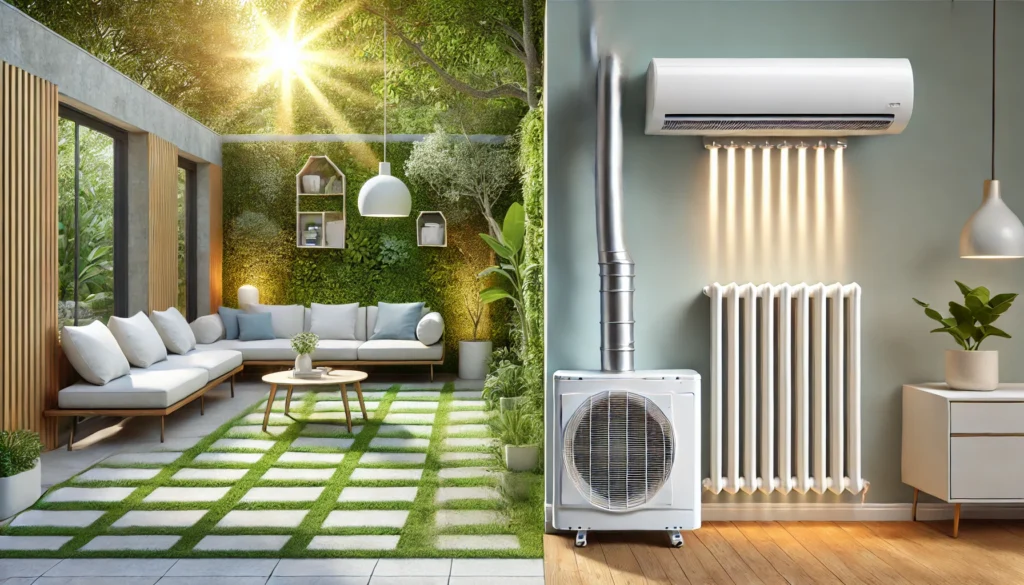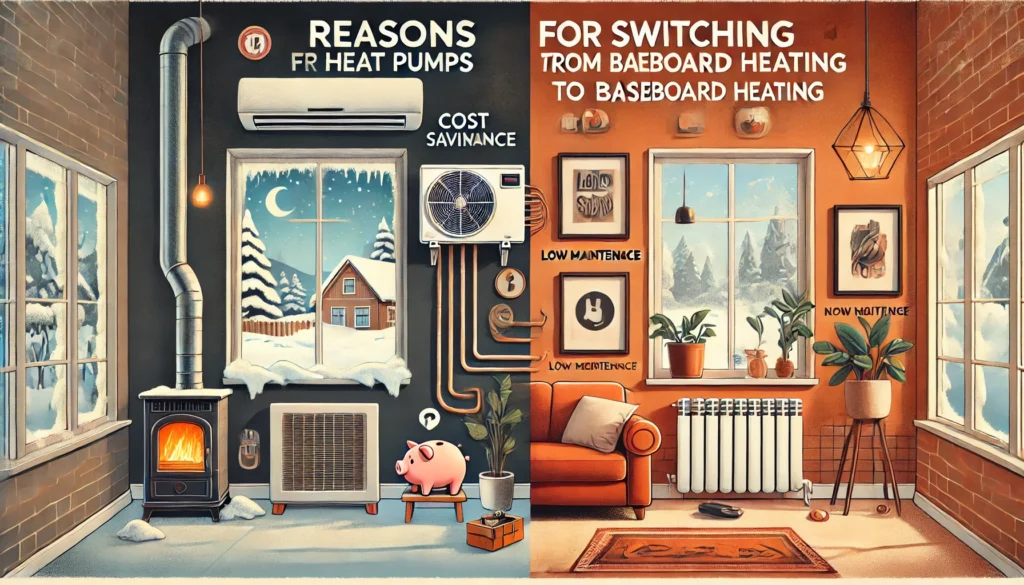As the quest for efficient and cost-effective home heating solutions continues, many homeowners face the decision of whether to stick with their existing heating system or transition to another. While heat pumps are celebrated for their energy efficiency and dual functionality, some people opt to switch to baseboard heating systems.
This article delves into the primary factors influencing such decisions, exploring the technical, economic, and situational aspects that drive homeowners toward baseboard heating.
Table of Contents
Understanding Heat Pumps and Baseboard Heaters
Heat Pumps: An Overview
Heat pumps are versatile HVAC systems that harness the principles of heat transfer to efficiently provide both heating and cooling for your home. Unlike traditional heating systems, heat pumps don’t generate heat; instead, they extract it from the outdoors and transfer it indoors.
This process is remarkably efficient, particularly in mild climates where outdoor temperatures don’t plummet too low. In warmer months, heat pumps reverse their operation, drawing heat from indoors and expelling it outdoors.
This cooling function makes them a reliable and energy-efficient solution for moderate climates. Heat pumps can utilize various heat sources, including air, water, and ground, each offering unique advantages and considerations.
Advantages of Heat Pumps:
While Traditional Heating Methods often rely on Fossil-Fuel-Based Systems that contribute to Greenhouse Gas Emissions, Heat Pumps offer a more Environmentally Friendly and Energy-Efficient solution for heating and cooling Homes. Unlike conventional systems, heat pumps harness heat from the surrounding environment, whether it’s the air outside or the ground beneath your home.
This Dual Functionality allows them to both heat your home during Winter and cool it during Summer. By reducing reliance on fossil fuels and minimizing energy consumption, heat pumps can significantly lower your carbon footprint and energy bills.
Challenges of Heat Pumps:
Heat pumps, while offering energy efficiency and eco-friendliness, face several hurdles. Initial Costs can be higher than conventional heating systems, especially for high-efficiency models. Installation can be complex, often requiring professional expertise. Complex Equipment and intricate Ductwork Needs can further elevate costs.
Additionally, Cold Climates can significantly impact Efficiency and performance, especially at Temperatures below freezing. Regular Maintenance and Occasional Repairs are necessary to ensure optimal operation. While Operating Costs are generally lower than traditional systems, careful consideration of these factors is crucial when evaluating heat pump suitability.
Baseboard Heaters: An Overview
Baseboard heaters offer a discreet and efficient way to heat your home. These low-profile units, typically installed along walls, use either electric systems or hydronic systems to warm the air. In electric systems, a heating element within the baseboard warms the surrounding air, which then rises and circulates throughout the room through a process known as convection.
Hydronic systems, on the other hand, utilize hot water to heat the baseboard, providing a more consistent and energy-efficient heating solution. While baseboards are excellent for supplemental heating in specific rooms or zones, they may not be suitable as primary heating sources in colder climates or larger homes.
However, in certain scenarios, such as mild climates or as a complement to other heating systems, baseboard heaters can provide comfortable and reliable warmth.
Advantages of Baseboard Heaters:
Baseboard heaters are a popular choice for heating homes due to their minimal aesthetic appeal and easy installation. Unlike traditional radiators, they are installed along the base of walls, taking up minimal floor space. They are also easy to maintain, requiring little to no ongoing upkeep.
One of the key advantages of baseboard heaters is their independent zoning capabilities. This allows you to set different temperature settings for each room in your home, reducing energy waste and optimizing heating costs. Additionally, baseboard heaters operate at low temperatures, making them safe and energy-efficient.
Challenges of Baseboard Heaters:
Baseboard heaters are a common heating solution, but they come with certain drawbacks. One significant challenge is their high energy consumption. These heaters can be costly to operate, especially during long, cold months. Additionally, limited cooling capabilities restrict their use to providing warmer air during colder periods.
Another issue is space constraints. Baseboard heaters occupy wall space, limiting furniture placement options. This can be particularly problematic in smaller rooms or spaces with specific design requirements.

Reasons for Switching from Heat Pumps to Baseboard Heating
Climate Considerations
While heat pumps are efficient in moderate climates, they can struggle to perform efficiently in regions with extremely cold winters. As temperatures drop, the ability of heat pumps to extract heat from outdoor air significantly diminishes.
This can lead to homeowners in such climates to prefer baseboard heating for its ability to provide consistent warmth regardless of outdoor conditions.
Upfront Costs
While installing a heat pump, especially a geothermal system, can be prohibitively expensive for many homeowners, baseboard heating systems offer a more affordable option. The initial cost of purchasing and installing a baseboard heating system makes it an attractive alternative for budget-conscious individuals.
Maintenance Requirements
While heat pumps are efficient systems, they are also complex systems that require regular maintenance to function efficiently. Their various components, including compressors and refrigerants, often need professional servicing.
In contrast, baseboard heaters are simple devices with no moving parts, making them low-maintenance solutions. This simplicity and lack of intricate components make baseboard heaters an appealing choice for those seeking hassle-free heating.
System Longevity
Baseboard heaters are known for their durability and minimal degradation over time. Unlike heat pumps, which typically have a lifespan of 10-15 years, baseboard heaters can last significantly longer. This makes them a hassle-free option for homeowners seeking a durable and long-lasting heating solution.
Performance-wise, baseboard heaters offer consistent and reliable heat distribution, ensuring a comfortable indoor environment. While heat pumps may experience decreased performance over time, baseboard heaters continue to operate efficiently, making them a popular choice for those prioritizing longevity and minimal maintenance.
Heating Preferences
Baseboard heaters offer a direct and localized approach to heating, appealing to those who prefer zone-specific control. Unlike heat pumps that distribute heat through ducts or a central system, baseboard heaters allow for targeted heating of individual rooms. This is particularly useful in homes where not all rooms need to be heated simultaneously.
Energy Source Availability
Homeowners in areas where electricity is unreliable or expensive may find that electric baseboard heaters are a simpler, more practical choice than heat pumps. While heat pumps are energy-efficient, they rely on electricity to operate. In some cases, backup systems like natural gas may be necessary, which can add to the overall cost and complexity of the system.
Space Considerations
Baseboard heaters are a compact and easy-to-integrate heating solution, particularly well-suited for smaller homes or apartments. Unlike heat pumps, which often require outdoor units and sometimes extensive ductwork or piping, baseboard heaters are wall-mounted and take up minimal space.
This makes them a challenging proposition for those with limited space. With baseboard heaters, you can easily add heat to any room without major renovations or significant space commitments.
Noise Concerns
While heat pumps are energy-efficient, some homeowners find the operational noise of especially older models to be disruptive. Baseboard heaters, on the other hand, offer silent operation, creating a more peaceful living environment.

Case Studies: Real-Life Examples
Cold Climate Transition
While traditional heating systems like baseboard heating often struggle to provide reliable, consistent warmth in sub-zero temperatures, particularly in cold spots, air-source heat pumps offer a more sustainable and efficient solution.
These innovative systems can provide both heating and cooling, reducing reliance on fossil fuels and lowering high utility bills. By harnessing the heat from the outside air, even in frigid conditions, air-source heat pumps offer a promising pathway to a warmer, greener future.
Cost-Conscious Homeowners
For homeowners seeking to reduce their high cost of heating without sacrificing comfort, a new system may be the answer. While traditional heating methods like electric baseboard heaters can provide adequate heat, they often come with a hefty price tag.
A more cost-effective solution is to consider a heat pump. These energy-efficient systems can provide both heating and cooling, reducing your overall energy consumption. While the initial investment may be higher, heat pumps can save you a significant amount of money in the long run.
In fact, with proper maintenance, a heat pump can last for many years, often requiring only a fraction of the upfront expense of traditional heating systems.
Renovation Challenges
Renovation of a small New York City apartment presents unique challenges. One such challenge is the integration of a heat pump system into a space constrained by baseboard heating and installation demands. The homeowner must carefully consider factors like available space and potential disruptions to the existing infrastructure.
Check similar Guide: What Makes People Switch from Heat Pumps to Baseboard Heaters?
Conclusion
While heat pumps have gained popularity for their energy efficiency and eco-friendliness, many homeowners are still opting for baseboard heating. This shift is often driven by a careful consideration of upfront costs, long-term goals, and specific needs.
Heat pumps can be a significant investment, especially in colder climates. Their installation costs can be higher, and they may require additional maintenance to ensure optimal performance. In contrast, baseboard heating offers a more practical and low-maintenance solution. Its low installation costs and simple operation make it an attractive choice for many homeowners.
Ultimately, the decision to switch from heat pumps to baseboard heating depends on a variety of factors, including climate, energy costs, and comfort requirements. By carefully evaluating these factors and consulting with HVAC professionals, homeowners can make informed decisions that best suit their unique situations.
Frequently Asked Questions
What is the main reason people switch from heat pumps to baseboard heaters?
The primary reason is climate suitability. In colder climates, heat pumps may lose efficiency, leading homeowners to choose baseboard heaters for their consistent and reliable performance in extreme temperatures.
Are baseboard heaters more cost-effective than heat pumps?
It depends on the scenario. Baseboard heaters have lower installation costs but may result in higher long-term operational costs if used extensively. They are more cost-effective for localized or occasional heating compared to heat pumps.
Do baseboard heaters work well in extremely cold climates?
Yes, baseboard heaters perform consistently in all climates because their functionality does not depend on outdoor temperatures, unlike air-source heat pumps.
Is it cheaper to install baseboard heaters compared to heat pumps?
Yes, baseboard heaters are significantly cheaper to install. A single unit typically costs between $300 and $1,000, while heat pump installations range from $4,000 to $10,000 or more.
Can baseboard heaters replace heat pumps entirely?
Baseboard heaters can replace heat pumps in terms of heating, but they lack cooling capabilities. Homeowners who need both heating and cooling might still prefer heat pumps or consider alternative cooling systems.
How long do baseboard heaters last compared to heat pumps?
Baseboard heaters generally have a longer lifespan, often exceeding 20 years. Heat pumps typically last 10 to 15 years, depending on usage and maintenance.
Are baseboard heaters easier to maintain than heat pumps?
Yes, baseboard heaters require minimal maintenance. They have no moving parts, making them more straightforward to maintain than heat pumps, which need regular servicing.
Do baseboard heaters consume more electricity than heat pumps?
Yes, baseboard heaters are less energy-efficient and consume more electricity for the same heating output. Heat pumps are generally more efficient, especially in moderate climates.
Can baseboard heaters be used for zone heating?
Absolutely. Baseboard heaters are ideal for zone heating as they allow independent temperature control for each room, reducing energy waste in unused areas.
Do heat pumps work efficiently in very cold temperatures?
Heat pumps lose efficiency in freezing temperatures, especially air-source models. In such conditions, they often require a backup heating source, leading some homeowners to switch to baseboard heating.
Are baseboard heaters noisier than heat pumps?
No, baseboard heaters are completely silent during operation. In contrast, heat pumps may generate some noise from their mechanical components.
What are the upfront costs associated with switching from heat pumps to baseboard heaters?
Switching to baseboard heaters is relatively affordable, as the installation process is simple. The cost includes purchasing heaters and minimal labor for installation, making it much cheaper than installing a heat pump.
Can you combine baseboard heaters with heat pumps?
Yes, many homeowners use baseboard heaters as a supplemental heating option alongside heat pumps, especially in areas where the heat pump struggles during extreme cold.
Do baseboard heaters take up more space than heat pumps?
Baseboard heaters occupy wall space along the base of a room, which can limit furniture placement. However, they don’t require outdoor units like heat pumps do, making them less intrusive overall.
Is switching from a heat pump to baseboard heating environmentally friendly?
It depends on the electricity source. If the electricity used is generated from renewable sources, baseboard heaters can be eco-friendly. However, if powered by fossil-fuel-based electricity, they may have a higher carbon footprint compared to heat pumps.








